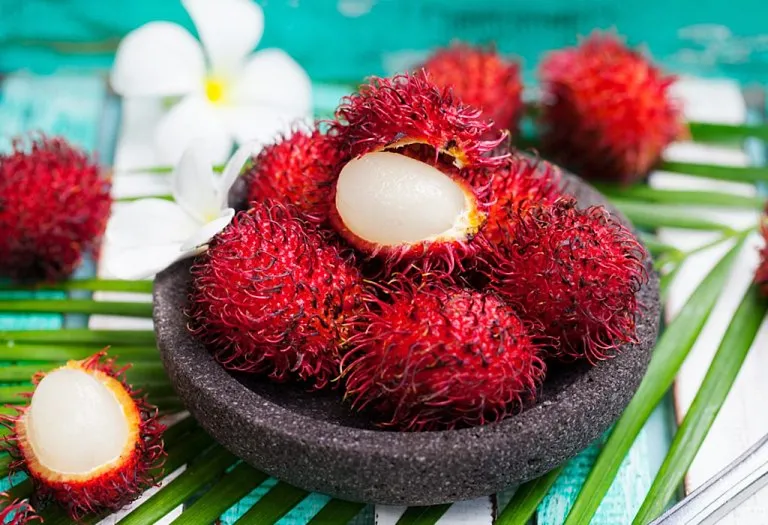Eating Rambutan during Pregnancy – Risks & Benefits

- What Is Rambutan?
- Nutritional Value of Rambutan
- Can Pregnant Women Eat Rambutan?
- Health Benefits of Eating Rambutan in Pregnancy
- Side Effects of Rambutan While Pregnant
- Points to Remember Before Buying and Storing Rambutan
- How to Include Rambutan in Your Pregnancy Diet?
- FAQs
When a woman gets pregnant, her diet must take a turn for the healthier. Lots of fresh fruits and vegetables must be added to her daily meals. The health benefits of common fruits like apples, bananas, grapes, and mangoes during pregnancy are well-known. But rambutan throws a bit of a surprise, with its unique name and equally unique appearance!
Rambutan is a rarely heard fruit, but it is an elixir of energy for those peckish moments that most expectant mothers experience all throughout their pregnancy. Rambutan contains iron, phosphorus, and other essential nutrients that help to prevent nausea, purify the kidneys, and improve the digestive system of moms-to-be. It also aids in blood circulation, which helps to prevent oedema (swelling of hands and feet) during pregnancy. Let’s read on all you need to know about consuming rambutan during pregnancy.
What Is Rambutan?
Rambutan is a tropical fruit, commonly grown throughout Indonesia, Malaysia, the Philippines, and Thailand. It is closely related to other edible tropical fruits like lychee, longan, etc., and it derives its name from the Malay word for ‘hair’. Rambutan has a hairy appearance, with numerous hair fibres protruding on its outer surface. The fruit is succulent, juicy, and sweet, and it is packed with immense nutrients, carbohydrates, vitamins, and minerals. About 45% of the fruit is edible, with a sweet and tangy flavour like that of grapes or lychee. The fruit is rich in calcium, phosphorous, and Vitamin C, making it ideal for skin ailments, detoxification, and immunity.
Nutritional Value of Rambutan
Rambutan is a tropical fruit known for its sweet, juicy flesh enclosed in a hairy exterior. It not only delights the taste buds but also offers various nutrients essential for health maintenance. Here are its nutritional values per 100 gms (1).
| Nutrients | Values |
| Water | 82.1% |
| Protein | 0.9% |
| Fat | 0.3% |
| Glucose | 2.8 g |
| Fructose | 3.0 g |
| Sucrose | 9.9 g |
| Dietary fiber | 2.8 g |
| Calcium | 15 mg |
| Iron | 0.1 to 2.5 mg |
| Vitamin C | 70 mg |
| Potassium | 140 mg |
| Sodium | 2 mg |
| Magnesium | 10 mg |
Can Pregnant Women Eat Rambutan?
Yes, rambutan can be eaten by pregnant women. It offers a lot of health benefits and has no side effects (2). However, an overripe rambutan could have traces of alcohol (due to fermentation) and could prove harmful to the mother and the foetus. An overripe rambutan also contains high levels of sugar, which can be detrimental to expectant mothers with gestational diabetes.
Health Benefits of Eating Rambutan in Pregnancy
Is Rambutan good for pregnancy? Rambutan has several benefits for just about everybody, and the tree that bears the fruit also has several health benefits in its leaves and bark. However, the fruit is the powerhouse of nutrients for expectant mothers. Here are some benefits:
1. Reduces Nausea and Dizziness
For some women experiencing nausea and dizziness through all the trimesters, the sweet taste of the rambutan could give them some relief.

2. Rich Source of Iron
An excellent source of iron, rambutan is a great snack that will keep the haemoglobin levels in a pregnant woman under check. As it is rich in iron, it helps reduce fatigue in expectant mothers.
3. Fights Common Ailments
Rambutan helps in digestion and reduces constipation and diarrhoea with its phosphorus content. It helps expectant mothers to fight against the common cold, flu, headache, and fever and stay healthy throughout their pregnancy. Add rambutan to your daily diet to reduce the risk of falling ill.
4. Source of Vitamin E
A great remedy for all skin ailments for expectant mothers, rambutan helps reduce stretch marks after delivery. The Vitamin E content in Rambutan helps to prevent premature ageing, acne, itchy skin, and dullness of skin tone during pregnancy.
5. Controls Blood Pressure and Cholesterol
Rambutan enhances blood circulation, thereby controlling blood pressure. It helps to reduce swelling of hands and feet during pregnancy. It is a great way to address health issues, rather than administering medicines.
6. Aids Digestion
Regular consumption of Rambutan helps in streamlining the digestive tract and helps in reducing problems of bowel movement, diarrhoea and constipation. The phosphorus present in the fruit purifies the kidneys and also helps the body to repair damaged tissues.
7. Detoxifies the Body
Toxins deposited in our body are one of the main causes of illnesses. Rambutan eliminates the toxins from our body and also gets rid of the heavy metals in the body.
8. Improves Immune System
Pregnant women have a more delicate immune system as compared to non-pregnant adults, making them prone to several ailments, disorders, and infections. Rambutan contains copper, which facilitates the production of white blood cells to fight against disease-causing microorganisms.

Side Effects of Rambutan While Pregnant
Rambutan, like many fruits, is generally safe for consumption during pregnancy when eaten in moderation. However, there are a few considerations expecting mothers should keep in mind:
- Allergic Reactions: Some individuals may be allergic to rambutan, leading to allergic reactions such as itching, swelling, or difficulty breathing. Pregnant women with known allergies should avoid consuming rambutan or consult with their healthcare provider before doing so.
- Digestive Issues: Excessive consumption of rambutan may lead to digestive discomforts such as bloating, gas, or diarrhea. Pregnant women should consume rambutan in moderation to avoid such issues and maintain a balanced diet.
Points to Remember Before Buying and Storing Rambutan
Before buying rambutan, you should know how to choose the best one. Here are a few ways to find out which fruit is good to buy and ways to store them:
- Good rambutans are red in colour. The more vivid the red colour, the better.
- Rambutan for pregnant ladies must be adequately ripe, and not overripe.
- Pick ones which are firm, and the hairy spikes are fresh and dark red in colour.
- If the hairy spikes look shrivelled, then it is a sign that the fruit is rotting.
- Good rambutans have firm, translucent flesh on the inside with no excess juice.
- Store rambutan at room temperature if you plan to consume them within a few days to maintain optimal ripeness and flavor.
- If you need to store them for longer periods, place them in the refrigerator in a perforated plastic bag to prevent moisture buildup and extend their freshness.
How to Include Rambutan in Your Pregnancy Diet?
Rambutan can be a delightful addition to your pregnancy diet, providing a burst of sweetness along with essential nutrients. Here are some creative ways to incorporate rambutan into your meals:
- Fresh Snack: Enjoy rambutan as a refreshing snack on its own, peeling off the skin and popping the juicy flesh into your mouth.
- Smoothies: Blend rambutan with other fruits like bananas, strawberries, and yogurt to create a nutritious and delicious smoothie for a quick energy boost.
- Fruit Salad: Add diced rambutan to your favorite fruit salad for a tropical twist, combining it with other fruits like pineapple, mango, and kiwi.
- Desserts: Use rambutan as a topping for desserts like ice cream, yogurt, or pudding, or incorporate it into fruit sorbets for a guilt-free treat.
FAQs
1. How much rambutan should pregnant women eat?
Pregnant women can enjoy rambutan in moderation as part of a balanced diet. Aim for a serving size equivalent to one or two fruits per day, considering individual dietary needs and consulting with a healthcare provider if unsure.
2. Can eating rambutan cause any allergic reactions during pregnancy?
While allergic reactions to rambutan are rare, some individuals may experience itching, swelling, or difficulty breathing. Pregnant women with known allergies should exercise caution and avoid consuming rambutan or consult with their healthcare provider before doing so.
3. Can I eat rambutan during breastfeeding?
Rambutan is generally safe to eat during breastfeeding, but moderation is key. Including rambutan in your diet can provide essential nutrients, but be mindful of any potential allergies or digestive issues. If you notice any adverse reactions in yourself or your baby after consuming rambutan, consult with a healthcare provider.
Rambutan the tropical fruit has several advantages for pregnant women, and can be consumed on a daily basis. Enjoy eating rambutan for pregnancy to the fullest, but make sure you consult a doctor if you have a history of allergies.
References/Resources:
1. Rambutan; New Crop factsheet; https://hort.purdue.edu/newcrop/CropFactSheets/Rambutan.html
2. Sukchan. P, Liabsuetrakul. T, Chongsuvivatwong. V, Songwathana. P, et al.; Inadequacy of nutrients intake among pregnant women in the Deep South of Thailand (BMC Public Health); National Library of Medicine; https://www.ncbi.nlm.nih.gov/pmc/articles/PMC2958163/; September 2010
3. Diana. R, Rachmayanti. R, Anwar. F, Khomsan. A, et al.; Food taboos and suggestions among Madurese pregnant women: a qualitative study (Journal of Ethnic Foods); Science Direct; https://www.sciencedirect.com/science/article/pii/S2352618118301446; December 2018
4. Rambutan; Wisconsin Department of Public Instruction; https://dpi.wi.gov/sites/default/files/imce/school-nutrition/pdf/fact-sheet-rambutan.pdf
5. Gorinstein. S, Zemser. M, Haruenkit. R, Chuthakorn,. R, et al.; Comparative content of total polyphenols and dietary fiber in tropical fruits and persimmon (The Journal of Nutritional Biochemistry); National Library of Medicine; https://pubmed.ncbi.nlm.nih.gov/15539312/; June 1999
6. Thinkratok. A, Suwannaprapha. P, Srisawat. R; Safety assessment of hydroethanolic rambutan rind extract: acute and sub-chronic toxicity studies; National Library of Medicine; https://pubmed.ncbi.nlm.nih.gov/25345248/; October 2014
Also Read:
Kiwi Fruit during Pregnancy
Consuming Apricots in Pregnancy
Papaya (Papita) while Pregnant
Benefits of Eating Ice Apple during Pregnancy
Was This Article Helpful?
Parenting is a huge responsibility, for you as a caregiver, but also for us as a parenting content platform. We understand that and take our responsibility of creating credible content seriously. FirstCry Parenting articles are written and published only after extensive research using factually sound references to deliver quality content that is accurate, validated by experts, and completely reliable. To understand how we go about creating content that is credible, read our editorial policy here.




































